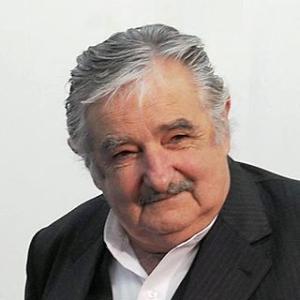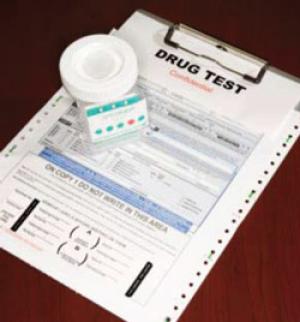StoptheDrugWar.org needs your support to continue our work during the most important time in drug reform we've ever seen. We have gifts to send you too, with donations of $15 or more.
Sens. Pat Leahy (D) and Rand Paul (R) have joined together to introduce a mandatory minimum sentence reform bill. The bill would expand the "safety valve" to all federal offenses, not just selected drug offenses.
The discussion about legalizing marijuana commerce and cultivation is about to get underway in Uruguay. The president wanted to legalize it last fall, but backed off in the face of public opposition. Now, there will be an educational process to win support.
A drug dog's sniff of a home's front door is a search under the meaning of the Fourth Amendment and police must thus first obtain a search warrant, the US Supreme Court ruled Tuesday.
There is plenty of action in state legislatures, the battle over rescheduling continues, a Maine dispensary gets called out for using pesticides, and much more.
A Missouri technical college wanted to drug test all incoming students, but for a second time, a federal district court judge has said no, and she is likely to make it permanent when the case goes to trial in July.
As politicians dither, New Yorkers hoping to end New York City's reign as marijuana arrest capital of the world will have to wait. In the meantime, another thousand people are getting popped for pot in the Big Apple every week.
Medical marijuana legislation is moving in Maryland. A bill passed the House Monday and now heads to the Senate.
Medical marijuana bills have now been introduced this year in New York state.
An attempted drug arrest turned deadly at a Motel 6 in Carlsbad, New Mexico, Monday. It's the eighth drug war killing by police so far this year.
Dirty cops go down in Miami and New York, so does a jail guard in DC, and a Long Island dope squad's problems continue to mount.
Dear friend,
StoptheDrugWar.org needs your help to continue our programs -- like this newsletter,
Drug War Chronicle -- during this most important time in the cause there has ever been.
Click here for some examples of how activists around the world rely on
Drug War Chronicle in their work.
As our thanks for your support, we continue our full set of membership offers, some of them available with donations of $15 or greater to our organization. We also continue to offer, with donations of $35 or more, "
Marijuana Legalization: What Everyone Needs to Know," authors of which were
recently hired to consult with the state of Washington on implementing legalization there.
The newest item is a pair of reports that highlight the US and international legal landscapes as legalization becomes a mainstream issue. (We'll send you both for the $15.) Though the text of each report can be found online, for $15 or more you can hold the nice printed copies -- the history in the making -- in your hands. They are:
- "On the Limits of Federal Supremacy: When States Relax (or Abandon) Marijuana Bans," a Cato Institute Policy Analysis by Vanderbilt law professor Robert Mikos, explores the limits in federal law and resources for enforcing marijuana prohibition in states that have legalized.
- "Governing the Global Drug Wars," a special report by London School of Economics IDEAS, details the history of the global prohibition regime; the obstacles it poses to nations seeking to explore legalization and other reforms, and efforts by nations and agencies to transform the system into one respecting public health and human rights.
We are also pleased to continue offering the following items (while supplies last), now also with donations of $15 or more:
- Emperor of Hemp DVD, about the life and work of Jack Herer (memorial tribute edition)
- StoptheDrugWar.org strobe light
- StoptheDrugWar.org stamp and ink pad
- StoptheDrugWar.org mouse pad
Though we offer many items for $15, I hope you will consider making a larger donation if you are able, or supplementing your initial gift with a monthly one. If the gifts are not important to you, I hope you'll consider sending a donation that's just for our work.
Donations can be tax-deductible, supporting our educational work, or non-deductible, supporting our lobbying work. (Note that selecting any gift items reduces the amount of your donation that is deductible -- which with a smaller gift amount can be most of it.) They can be made online on our web site by credit card or PayPal, or sent by mail to P.O. Box 18402, Washington, DC 20036. If you are donating by check, please make it payable to DRCNet Foundation (if tax-deductible) or Drug Reform Coordination Network (if not deductible).
If you wish to donate stock, the information to give your brokerage is Ameritrade, (800) 669-3900), DTC #0188, and account number 781926492 for tax-deductible gifts or 864663500 for non-deductible gifts -- please make sure to contact us if donating in this way.
Thank you for standing with us to stop the drug war's cruelties and meet the opportunity this time offers to make a brighter future. As recent events show: Time, and the truth, are on our side!
Sincerely,

David Borden, Executive Director
StoptheDrugWar.org
Washington, DC
http://stopthedrugwar.org
back to top
Sen. Rand Paul (R-KY) joined Senate Judiciary Committee Chairman Sen. Patrick Leahy (D-VT) in introducing legislation that would give federal judges greater flexibility in sentencing in cases where mandatory minimum sentences are involved. The bill, Senate Bill 691, also known as the Justice Safety Valve Act of 2013, would expand the "safety valve" to apply to all federal crimes.

Senators Patrick Leahy (D-VT) and Rand Paul (R-KY)
Currently, the "safety valve" allows judges to impose a sentence below the mandatory minimum only in some drug cases. Only about 25% of federal drug offenders are currently able to take advantage of the "safety valve" to earn reduced sentences.
The bill comes as the federal government faces chronic budget crises and a federal prison population that has grown nearly 10-fold in the past three decades and by 55% since 2000. In 1980, there were some 25,000 federal prisoners; now there are more than 217,000, and almost half of them are drug offenders. At more than $7 billion this year, the federal prison budget now accounts for almost one-quarter of all Justice Department spending, and is up by $2 billion in the last five years alone.
The bill also comes amidst a rising hue and cry to move away from mandatory minimums. The non-partisan Congressional Research Service issued a
January report that suggested that instead of expanding federal prison construction, Congress "could consider options such as modifying mandatory minimum penalties," as well as increased resort to probation, reinstating parole in the federal system, and "repealing federal criminal statutes for some offenses."
Similarly,
the US Sentencing Commission surveyed federal judges in 2010 and found that 70% of the 600 judges who responded favored expanding the "safety valve" to all mandatory minimum sentences. Rising federal prison budgets and sentencing reform have also been a continuing concern for Chairman Leahy. He held
hearings last summer on the issue, and now he has sponsored legislation to do something about it.
"As a former prosecutor, I understand that criminals must be held accountable, and that long sentences are sometimes necessary to keep criminals off the street and deter those who would commit violent crime," Sen. Leahy said. "Our reliance on mandatory minimums has been a great mistake. I am not convinced it has reduced crime, but I am convinced it has imprisoned people, particularly non-violent offenders, for far longer than is just or beneficial. It is time for us to let judges go back to acting as judges and making decisions based on the individual facts before them. A one-size-fits-all approach to sentencing does not make us safer."
"Our country's mandatory minimum laws reflect a Washington-knows-best, one-size-fits-all approach, which undermines the constitutional separation of powers, violates the our bedrock principle that people should be treated as individuals, and costs the taxpayers money without making them any safer," said cosponsor Sen. Paul. "This bill is necessary to combat the explosion of new federal criminal laws, many of which carry new mandatory minimum penalties."
Drug and sentencing reform advocates celebrated the bill's introduction, although some thought that even more should be done.

The Yankton (SD) Federal Prison Camp. It used to be Yankton College, but now houses minimum security prisoners. (wikimedia.org)
"I am thrilled that Sen. Leahy and Sen. Paul are promoting this common-sense sentencing reform," said Julie Stewart, founder and executive director of
Families Against Mandatory Minimums (
FAMM). "The mandatory minimum sentences Congress might be appropriate in many cases, but certainly not in every case, especially those involving non-violent offenders. By giving courts more flexibility, Congress will ensure that judges use our scarce prison beds and budget to keep us safe from truly violent offenders."
"Congress must reexamine mandatory minimum sentencing to determine whether they are necessary and appropriate while also analyzing the racial disparities that have arisen in the imposition of mandatory sentences," said Jasmine Tyler, deputy director of national affairs for the
Drug Policy Alliance. "This bill is a step in the right direction. While overdue, the recent reform of the crack-powder cocaine sentencing disparity did not do enough to alleviate mass incarceration, or racial disparities, in the federal system. Passage of this bill will hopefully mean more judges won’t give low-level drug law offenders
draconian sentences reserved for drug kingpins. Research has shown that more than half of all federal drug law offenders had little or no criminal history but they make up more than half of all federal prisoners."
"We are pleased that after decades of 'lock 'em up' rhetoric, Republicans and Democrats are beginning to realize that ever increasing penalties are not the most effective way to keep Americans safe," said Jeremy
Haile, federal advocacy counsel for the
Sentencing Project. "Nowhere is this more true than in the area of mandatory minimum penalties, which are limited because they address severity of punishment, not certainty. A recent Congressional Research Service report shows that mandatory minimums are a primary driver of our high prison populations and costs. Moreover, they are rife with racial unfairness. While it would be better to eliminate mandatory minimums altogether, we are pleased that Senators Leahy and Paul have introduced legislation that would mitigate their harshest effects. Congress should take up this legislation to address ineffective 'one size fits all' mandatory minimum penalties that allow little consideration for individual characteristics and drive racial disparities in sentencing."
And, as Nora Callahan of the
November Coalition, a drug reform group that concentrates on federal prisoners, has been pointing out for years, mandatory minimum reforms and sentencing reforms in general are "back end" solutions. While such measures are a necessary corrective to ameliorate what Leahy called the country's "mass incarceration problem," the more radical solution is on the "front end" -- stopping those federal arrests and prosecutions.
"It's a good news bill, don't get me wrong," Callahan said Thursday. "Dismantling the drug war a brick at a time is one way to get rid of it -- or will we just create more space for more people to do less time? I can't help but know that leaders can get bolder than this. And those judges would do well to use a lot more discretion pretrial and start disallowing various 'extrajudicial procedures' like count-stacking, reliance on informants and rewarded witnesses; fast-tracking--and it wouldn't take an act of Congress."
back to top
Last fall, Uruguayan President Jose Mujica proposed legalizing marijuana commerce and cultivation (marijuana possession has never been a crime there), but shortly thereafter postponed action on the proposed legislation in the face of public opposition. Now he's ready for the country to have a discussion about it.
In December,
Mujica postponed action on the bill, even though his party and its allies control the legislature. He cited polling that showed 64% of the public had reservations about allowing pot sales and cultivation.
Mujica continues to support the bill, but wanted to slow the process down to educate the public. Now, that process is beginning. Starting on April 4, a nationwide dialog on the bill is set to get underway. The three-month public debate will feature round tables, seminars, and conferences across the country and,
Mujica hopes, bring public opinion around.
Mujica, a former leftist guerrilla in the
1970s, has argued that legalizing the commerce in marijuana would weaken drug smuggling gangs and fight petty crime. Uruguay is one of the safest Latin American nations, but has been scarred by criminal violence associated with the drug trade.
The bill would create a National Cannabis Institute to regulate commercial marijuana production and distribution. But unlike reports from last fall, it will not create state marijuana stores. The Institute would also come up with penalties for rule-breakers and help design programs to warn of the risks of pot smoking. For private households, the bill would allow the cultivation of up to six plants and the possession of up to 17 ounces.
If the bill becomes law, Uruguay would become the first country to formally legalize marijuana commerce. Such commerce had gone on in Holland for decades, with the laws against it still on the books, but ignored under the Dutch policy of "pragmatic tolerance." Other countries have decriminalized marijuana possession, but not the commerce.
back to top
The US Supreme Court Tuesday ruled that a drug dog's sniff of a residence's front door is a search under the meaning of the Fourth Amendment and that police must therefore obtain a search warrant before unleashing the hounds. The case was Florida v. Jardines.
While the high court has previously ruled that drug dog sniffs of vehicles stopped on the highway, packages at shipping centers, or luggage at airports do not constitute a search under the Fourth, it sets a higher standard for people's homes. When it comes to the Fourth Amendment, "the home is first among equals," Justice
Antonin Scalia wrote for the 5-4 majority.
"A police officer not armed with a warrant may approach a home and knock, precisely because that is no more than any private citizen might do," Scalia reasoned. "But introducing a trained police dog to explore the area around the home in hopes of discovering incriminating evidence is something else. There is no customary invitation to do that."
The case arose when a Miami police detective investigating an anonymous tip about a marijuana growing operation had his drug dog sniff the base of the home's front door. The dog "alerted" on the scent of marijuana, and only then did police obtain a warrant to search the home. They then found 25 pounds of pot inside and arrested
Jardines.
Jardines was charged with trafficking in marijuana, but the trial court approved his motion to suppress the evidence on the basis that the drug dog sniff amounted to a warrantless search. The Florida Supreme Court upheld the trial court, and the state of Florida then appealed to the Supreme Court.
The 5-4 decision sundered the typical liberal-conservative split on the court. Joining the conservative Scalia in the majority was conservative Justice Clarence Thomas, along with liberal justices Ruth Bader
Ginsburg, Sonia
Sotomayor, and Elena
Kagan.
In a concurring opinion joined by
Ginsburg and
Sotomayor,
Kagan went further than Scalia, arguing that the drug dog sniff violated
Jardines' reasonable expectation of privacy.
In a dissenting opinion, Justice Samuel
Alito, joined by Chief Justice John Roberts, Justice Anthony Kennedy, and Justice Stephen
Breyer, rejected the privacy argument and opined that the search should have been upheld.
"A reasonable person understands that odors emanating from a house may be detected from locations that are open to the public,"
Alito wrote. "A reasonable person will not count on the strength of those odors remaining within the range that, while detectable by a dog, cannot be smelled by a human."
But that was the minority opinion. As of now, if the police want to use a drug dog to sniff a home's front door, they need to get a warrant.
back to top
There is plenty of action in state legislatures, the battle over rescheduling continues, a Maine dispensary gets called out for using pesticides, and much more. Let's get to it:
National
Last Friday,
Americans for Safe Access petitioned the DC Circuit Court for a rehearing before a full panel in its fight to force the federal government to reschedule marijuana. The move comes after a three-judge panel in January granted plaintiffs standing, but denied the appeal on its merits. In so doing, it set a near impossible standard for forcing rescheduling.
California
Last Thursday,
prosecutors in Vallejo dropped charges against dispensary operator Matt Shotwell. The move marked an ignominious end to a series of a dozen dispensary raids conducted by Vallejo Police in early 2012. At least six dispensaries were raided, some repeatedly, but now cases against all six have now been dropped. The police raids came after the city council voted to impose taxes on dispensaries.
On Tuesday,
the Concord city council approved an outdoor cultivation ban. The ban came despite only 14 complaint calls in the city of 120,000 residents. Council members cited concerns about public safety and "odiferous blight." Officials did say enforcement of the ban would be "complaint driven."
Colorado
On Tuesday,
an audit found problems in the state's medical marijuana enforcement division. A report from the state auditor found that a lack of funding for the program led to a lack of consistent enforcement and a nearly two-year delay in reviewing license applications. Problems mentioned included a failure to quickly review applications, a failure to follow state law, and removing marijuana from dispensaries under disciplinary review and a failure to make sure seized marijuana is destroyed properly. The report also criticized the Department of Revenue for spending too much on capital projects and then laying off staff members, leading to long delays and mistakes in reviewing applications.
Florida
On Wednesday,
activists were meeting with House Speaker Will Weatherford in an effort to get a pending medical marijuana bill moving. Weatherford has been blocking the bill, House Bill 1139, from getting a hearing or moving forward. No word at press time on the meeting results.
Illinois
Last Friday, the sponsor of a medical marijuana bill said it was just "one or two" votes shy of passing in the House. Rep. Lou Lang (D-Skokie) is the author of the medical marijuana bill, House Bill 1.
Maine
On Monday, state regulators said a dispensary was violating state rules by using pesticides on plants it was growing. Wellness Connection of Maine was ratted out by one of its own employees at its Auburn grow site, and investigators subsequently found pesticides present, as well as 20 other violations of the rules for growing marijuana. Wellness Connection said it would stop using pesticides and make other changes, too. State regulators will allow the dispensary to sell the pesticide-treated plants, but it must inform patients that chemicals were used in their growth. Wellness Connection, which runs half of the state's medical marijuana clinics, must now contact all prior and current patients to tell them pesticides were used in the products they purchased or are purchasing, and that they have stopped using the chemicals designed to keep bugs away.
Maryland
On Monday, a medical marijuana bill passed in the House. The bill, House Bill 1101, would set up a medical marijuana commission to which the academic medical centers could apply for permission to administer marijuana to patients within a research-focused program. Marijuana would be grown either by state-licensed growers or by the federal government.The bill now goes to the Senate.
Michigan
Last Friday, the Ypsilanti planning commission approved a new cultivation facility. It will be the second to operate in the city. The grow op won unanimous approval from the commission, on the condition that it construct a sidewalk and close a curb cut. Another facility has already been approved by the commission, but is awaiting site plan approval.
Nevada
Last Monday, Sen. Richard Segerbloom introduced a bill that would allow dispensaries to operate in the state. The bill, Senate Bill 374, would regulate dispensaries. Under the state's current medical marijuana law, there is no provision for dispensaries.
New York
On Tuesday, matching medical marijuana bills were introduced in the Assembly and Senate. Assemblyman Richard Gottfried filed Assembly Bill 6357 and Senator Diane Savino filed companion legislation, Senate Bill 4406. The bills would create a tightly regulated system of medical marijuana supply, complete with patient registries, but would not allow patients or designated caregivers to grow their own medicine. Patients would be limited to possessing no more than 2.5 ounces.
West Virginia
Last Thursday, Del. Mike Manypenny introduced a medical marijuana bill. In previous years, he has gone it alone, but this time around he has nine cosponsors. The bill is House Bill 2961.back to top
For the second time, a Missouri federal district court judge has granted a preliminary injunction blocking Linn State Technical College from drug testing all first-year and some returning students. The college had sought to implement the unprecedented drug testing regime in the fall of 2011, but had been blocked after the ACLU of Eastern Missouri filed suit on behalf of six students.
US District Judge Nanette
Laughrey issued a preliminary injunction stopping the program and the reporting of early test results in the fall of 2011, but the 8
th US Circuit Court of Appeals overruled her in January, finding her order too broad. The ACLU of Eastern Missouri then filed a narrower challenge, which
Laughrey has now granted.
"Today's decision affirms the privacy and personal dignity of hundreds of students who were forced to supply their college with urine samples before they could take any classes," said Tony
Rothert, the ACLU-EM's legal director. "Without a compelling need, a search of your bodily fluids is exactly the type of unreasonable search and seizure that the Constitution prevents the government from imposing."
Linn State had argued that it should be allowed to drug test students without any suspicion because some of its programs, such as aviation maintenance and heavy equipment operations, had a public safety component. But the ACLU-EM argued that its program was overly broad, and in granting the preliminary injunction, Judge
Laughrey cited the testimony of a mechanical engineering professor at the college who said his students handled nothing more dangerous than pencils.
While the federal courts have allowed
suspicionless drug testing in limited circumstances -- in occupations affecting public safety, among drug law enforcement personnel, and among limited sets of high school students -- they have generally deemed it a violation of the Fourth Amendment's proscription against unwarranted searches and seizures. The Linn State case is the first one known where a college sought to test a broad swath of the student population without any particularized suspicion.
The case will be argued in July. In the meantime, the preliminary order barring drug testing is in effect and suggests that Judge
Laughrey will grant a permanent injunction then.
back to top
People -- almost all of them young people of color -- are being arrested at the rate of a thousand a week in New York City for marijuana possession "in public view," but although a legislative fix was in sight this week, the state's political establishment couldn't come to an agreement on it. Instead, the legislature is going on vacation.
The New York City "in public view" arrests violate the spirit of the Empire State's 1977 marijuana decriminalization law, which made possession of small amounts of marijuana a civil offense, not a criminal one. They typically occur when the NYPD stops and frisks someone, then either reaches into his pockets or belongings or intimidates the detainee into pulling out his biggie himself and then charges him with the criminal misdemeanor of possession "in public view."
Through-out the legislative session,
Gov. Andrew Cuomo (D) and Senate and Assembly leaders talked about fixing the situation as part of the budget process. During his State of the State address, Cuomo had called for decriminalizing the possession of up to 15 grams "in public view," but with smoking in public remaining a misdemeanor. But on Thursday, Cuomo and the legislative leadership announced they had reached a final deal on the budget, one that didn't include marijuana law reform.
That doesn't mean decriminalization reform is dead this year -- the session will resume after a three-week hiatus -- but it is certainly delayed and possibly derailed without having the impetus of the budget agreement behind it. In either case, legislators and community activists blasted the leadership for punting on the issue while the arrests (and the costs) mount by the day.
"I am gravely disappointed that this budget failed to enact justice for the more than 44,000 individuals arrested last year based on a flawed law. Not only does allowing these arrests directly impact the lives of individuals and their communities, they are a gross misappropriation of city and state resources, and a waste of officer manpower that can be spent on more pressing law enforcement matters," said Assemblyman
Karim Camara, Chair of the New York State Black, Puerto Rican, Hispanic and Asian Legislative Caucus. "Changing this flawed law has the support of Mayor Michael Bloomberg, NYC Police Commissioner Kelly, the District Attorneys of the five boroughs, and Buffalo and Nassau and Albany counties, the Police Benevolent Association and major law enforcement agencies throughout the state. Yet politics trumped the policy that would be best for New York City and our state."
"This is an issue that cannot wait. Our tens of thousands of youth arrested annually under unfair practices shouldn't have to wait," said
Assemblymember Robert Rodriguez. "They deserve better -- they deserve justice and equality. And they deserve it now. We need to end this policy that has plagued our communities for too long and make public view possession a violation."
"Why is it acceptable to kick the can down the road when it comes to protecting the constitutional rights of young Black and Latino New Yorkers?" asked Alfredo
Carrasquillo, civil rights community organizer for
VOCAL-NY. "Getting this done is a test for the political leadership in Albany that right now they are failing. It's time to stop delaying justice when it comes to ending racially biased and costly marijuana arrests."
Since 2002, nearly 500,000 thousand people have been arrested in New York for marijuana possession -- the vast majority of those arrests, 440,000, took place in New York City. Last year alone in the city, there were nearly 40,000 such arrests, far exceeding the total marijuana arrests in the city between 1981 and 1995. The cost to taxpayers is $75 million a year, and over $600 million in the last decade. A report released earlier this week found that the NYPD had spent one million hours making these arrests over the past decade.
"Behind the one million police hours spent arresting young Black and Latino men is the shameful truth of 21st Century racism. These are unlawful, racially biased arrests, plain and simple. We need our elected officials to stand up for civil rights for all people" said Chino Hardin, Field Coordinator and Trainer with the Center for NuLeadership on Urban Solutions.back to top
The Maryland House of Delegates Monday approved a bill that would allow academic medical centers to provide medical marijuana to patients whose doctors recommend it. The measure passed easily on a 108-28 vote and is expected to pass the Senate as well.
The bill,
House Bill 1101, would set up a medical marijuana commission to which the centers could apply for permission to administer marijuana to patients within a research-focused program. Marijuana would be grown either by state-licensed growers or by the federal government.
Sponsored by Del. Dan
Morhaim (D-Baltimore), the bill would require the academic medical centers to specify qualifying medical conditions for treatment; treatment duration and dosage; where marijuana would be obtained; sources of funding; and a plan for monitoring data and outcomes, among other things. Programs would initially be approved for one year but could be extended.
"People who use medical marijuana to treat illnesses like cancer and multiple sclerosis shouldn't have to resort to the illicit market to obtain doctor-recommended medicine," said Dan Riffle, deputy director of government relations for the
Marijuana Policy Project, which has worked with legislators in Annapolis to move the bill. "States around the nation are successfully implementing programs that provide patients with safe, legal, and reliable access to medical marijuana."
While the bill has its problems -- it doesn't let patients grow their own, it would take years to implement and would either require federal cooperation or the centers to violate federal law -- it is a start, and can amended down the road if it proves unworkable.
"It may take several years for a program to get up and running, and federal policy presents a substantial obstacle to a law like this one ever being fully implemented," Riffle said. "Still, this bill gives us hope that patients could have safe, reliable access through programs that bear the imprimatur of some of the country’s most respected medical institutions."
Along with New England and the West, the Middle Atlantic region is one of the most medical marijuana-friendly in the country. If the bill passes the state Senate and is signed into law, Maryland will join neighbors Delaware and New Jersey as medical marijuana states, as well as Washington, DC, where the first dispensaries are set to open next month.
back to top
New York has become the latest state to see medical marijuana legislation introduced this year. On Tuesday, Assemblyman Richard Gottfried filed Assembly Bill 6357 and Senator Diane Savino filed companion legislation, Senate Bill 4406.
The bills would create a tightly regulated system of medical marijuana supply, complete with patient registries, but would not allow patients or designated caregivers to grow their own medicine. Patients would be limited to possessing no more than 2.5 ounces.
Drug reform and marijuana advocacy groups welcomed the introduction of the bills, but some expressed concerns that the measures as written do not provide enough protection for patients.
"Patients and their families in New York have suffered far too long because New York continues its retrograde approach to marijuana policies, even as other states move forward with more sensible approaches," said Julie
Netherland, deputy director of New York policy for the
Drug Policy Alliance. "The Drug Policy Alliance stands with hundreds of patients, healthcare providers, and organizations across New York in calling for the legislature to pass this sensible and humane legislation as soon as possible. A growing body of research shows that medical marijuana can be an effective treatment for a number of serious conditions. People living with multiple sclerosis, cancer, Parkinson's, HIV/AIDS and other debilitating conditions should not have to wait any longer to get access to a medicine that may help alleviate their pain and other symptoms. There is simply no sensible reason for patients and their families to wait any longer for relief."
"
Empire State NORML welcomes the long awaited introduction of S. 4406/A. 6357," the group said in a statement Tuesday. "We support the bill, and will work hard with Compassionate Care NY, the New York Cannabis Alliance, and other allies for Senate passage for the first time and
Gov. Cuomo’s signature."
But while supporting the bills, Empire State
NORML expressed two reservations. It noted that the bills have no affirmative defense provision for patients possessing more than 2.5 ounces for medically necessary reasons and asked that such provisions be added. And the group expressed concern over the lack of a patient or caregiver cultivation provision.
"Empire State
NORML strongly supports the right of certified patients or their designated caregivers to cultivate their own medicine," the group said. "But there should at least be a hardship provision for certain certified patients with transportation, physical or financial difficulties or their designated caregivers to cultivate their own medicine instead of having to rely on registered organizations."
Will this be the year New York joins its neighbors in embracing medical marijuana? The state shares borders with Connecticut, New Jersey, Pennsylvania, and Vermont, as well as Canada. All but Pennsylvania have already enacted medical marijuana laws.
back to top
Police in New Mexico shot and killed a man they were trying to arrest on drug charges Monday. Artesia resident Wesley Davis, 35, becomes the 8th person to die in US domestic drug law enforcement operations so far this year.

Wesley Davis (New Mexico DPS)
According to
KRQE TV, citing police sources, agents with the Pecos Valley Drug Task Force went to arrest Davis on a felony drug warrant at the Motel 6 in Carlsbad. But "an altercation broke out when agents tried to arrest Davis, and he was shot twice."
He was transported to the Carlsbad hospital, where he died.
The initial reports made no mention of Davis being armed, nor did they provide any further information about the circumstances of his death.
The names of the police shooter or shooters have not been released. The killing is being investigated by the New Mexico State Police.
back to top
Dirty cops go down in Miami and New York, so does a jail guard in DC, and a Long Island dope squad's problems continue to mount. Let's get to it:
In Southampton, New York,
drugs have gone missing from the police department evidence room. Crack cocaine, prescription pain pills, marijuana, and other drugs tied to a now disbanded Southampton Police Department drug unit are gone. An internal investigation is now underway. The drug unit was disbanded after unit supervisors, including current Police Chief Robert Pearce, allowed a member addicted to pain pills to return to duty with only a doctor's note. Prosecutors have so far dropped three cases where the evidence has gone missing.
In Washington, DC,
a DC jail guard was indicted last Friday for smuggling marijuana and other drugs into the jail. Guard Jonathan
Womble was arrested last month after a police dog detected the scent of marijuana inside his work locker while the dog's handler was going to the bathroom. Upon investigation, local authorities found that
Womble had been working with another man, who supplied with drugs to be delivered to a prisoner. That man has been arrested, too.
Womble faces charges of distribution of marijuana, cocaine, and heroin.
In Detroit,
a former Highland Park police officer pleaded guilty last Friday to taking money from people he thought were drug dealers to protect their shipments. Craig Clayton, 55, is one of four Highland Park officers charged last year with accepting bribes, conspiring to distribute cocaine, and carrying a firearm in the furtherance of a drug crime. In a plea bargain, he copped only to a single count of conspiracy to commit extortion. He's looking at up to 20 years in federal prison when sentenced. The case against the rogue cops began in August, when two of them arrested a man for carrying a firearm. They beat him and stole his money and jewelry, then told him if he paid them money, they could make the charge go away. The Highland Park police chief received a complaint, and the man agreed to work with investigators. He then delivered $10,000 in cash to the two officers, who then failed to show up for his arraignment. Then, the officers agreed to help the man with drug trafficking, and that's when Clayton entered the picture. In January, he drove a car containing what he thought was two kilos of cocaine and accepted $1500 cash from an undercover FBI agent for his services.
In Miami,
a former Miami police sergeant was sentenced last Friday to four years in federal prison for planting cocaine on a suspect, stealing drugs and money from other suspects, and lying about it to investigators. Raul Iglesias, 40, was convicted in January of eight counts, including two civil rights violations, conspiracy to possess and possession with the intent to distribute cocaine and crack cocaine, obstruction of justice, and making false official statements. He must also do three years probation when he gets out of prison.
back to top












